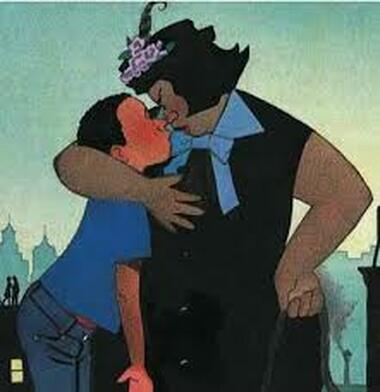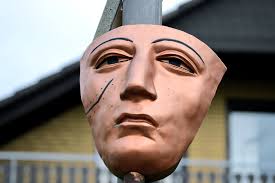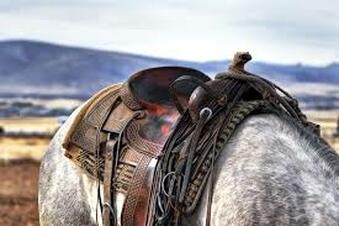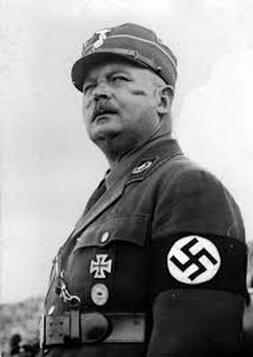|
I have a t-shirt that has a picture of a guy pointing his finger and saying, "Don't mind me I'm waiting for Godot." It's a reference to Samuel Beckett's tragicomedy Waiting for Godot. In it, Beckett uses outrageous dialogue to comment on the meaninglessness of words and actions in an existential world. If there was no God, he would be correct. The most beautiful sentiments ever expressed would become absurdist blathering. I have to disagree with Mr. Beckett though. I would argue that the most illogical and nonsensical utterances of humans anywhere are alive with both beauty and meaning providing you know how to listen. Sometimes finding the beauty in language is kind of like diving into a filthy dumpster in search of gold and diamonds. Once you find them though they are often very beautiful and inspiring, and it is those words that enable us to reclaim the world from those who don't believe. This is the first in a series of blogposts that I plan to do in honor of the power of words, especially those that vivify and inspire us when we feeling weak and tired and are looking for hope.  "All art, if it is any good, is some sort of a myth in the sense that it becomes what I call a cosmion, a reflection of the unity of the cosmos as a whole. " Eric Voegelin I'll start with this quote from the German born American philosopher Eric Voegelin who reminds us that mankind exists in a state of Metaxy (being between) and it is the acknowledging of this condition that makes art real. In other words, when artists create, they should always reference the fact that humans are, in the words of Oscar Wilde, ".. all in the gutter but some of us are looking at the stars." The fact that we exist, like that narrow part of an hour glass between infinity on both sides has to mean something, don't you think? For Voegelin, true art pays homage to this fact. Remember that next time you read a music critic say that some narcissistic purveyor of feces is a genius, and then cry a tear for what it means for our children's children.  “I have done things, too, which I would not tell you, son—neither tell God, if he didn’t already know. So you set down while I fix us something to eat. You might run that comb through your hair so you will look presentable.” Langston Hughes Every year, I could not wait to teach the short story Thank You Ma'am by Langston Hughes. It has one of my favorite characters in Mrs. Luella Bates Washington Jones, who walking home late one night, is accosted by a street urchin who tries to snatch her purse. It is a very short story, a miniature version of the Gospel, and Mrs. Jones is a perfect manifestation of the type of love, first spoken of by Jesus, that took the eminent Mr. Tolstoy over a thousand pages to explain. I would tear up every year when at the end, she says, "Now, here, take this ten dollars and buy yourself some blue suede shoes. And next time, do not make the mistake of latching onto my pocketbook nor nobody else’s—because shoes come by devilish like that will burn your feet. I got to get my rest now. But I wish you would behave yourself, son, from here on in," because the image burrows its way deep down inside of me and reminds me just what being human is supposed to be about. I could imagine Jesus peeking out the door of her apartment as the boy walks away into the night.  "I figure salvation is not without scars." Lindsay White Here I am exercising my personal bias again, my songwriting daughter Lindsay wrote this line in her song The Hound. She is in a book club that write songs about books. The theme for that month was Game of Thrones characters, and she selected to write about the Hound. The line caught my attention right away. It is such a beautiful line that in a few simple words expressed the very great truth that personal salvation always comes with scars. It is the price we pay at the checkout stand, scars and a few pennies for taxes. There are times I don't see eye to eye with my daughter about politics, but as long as she can -splain the economics of salvation in lines as spare as this, I know that she's gonna be okay. It also reminds me to roll up my sleeves and unbutton my shirt from time to time to examine my own scars.  “When Augustus came out on the porch the blue pigs were eating a rattlesnake—not a very big one. It had probably just been crawling around looking for shade when it ran into the pigs. They were having a fine tug-of-war with it, and its rattling days were over.” Larry McMurtry I don't know what inspired McMurtry to write this book (I figure it was because he's a Texan), but I am sure damn glad he did. Augustus McCrae could be my all time favorite character. Gus is like a wittier version of Socrates on horseback, spitting tobacco juice and spouting gobs of wisdom in between wooing a whore named Lorie and engaging in shootouts with bad guys. I almost could not stand it when he died and felt like the real world had lost someone we couldn't do without. McMurtry is a great writer, but some of his novels bum me out. Lonesome Dove is a masterpiece though, the War and Peace of the American West and is the best western novel ever in my humble opinion. If I had to go into seclusion, away from civilization for a prolonged period of time and could only take five books, besides the Bible, this is the only one I know for certain that I would take.  "On the night that Ernst Roehm died voices rang out In the rolling Bavarian hills And swept through the cities and danced in the gutters Grown strong like the joining of wills" Al Stewart I went through a period of life when the only music I ever listened to was created by the Scottish folk singer Al Stewart, most famous for the perfectly crafted pop song The Year of The Cat. He put out an historically themed album in 1973 named Past, Present, and Future. It was weird and wonderful at the same time. I felt back then that this would be the music that archeologists would dig out of the rubble five hundred years in the future, and say, " Maybe these people were not as nutty as the history books say they were." The line above is from the song The Last Day of June 1934 from the same album. The date mentioned in the title is the day that Hitler and his SS cohorts captured and murdered Ernst Roehm, a devoted disciple who, legend has it, met his grisly death giving a Nazi salute. Roehm was murdered at the behest of the Army, and his death cleared the way for Hitler to gain ultimate power over the State and setting the stage for the outbreak of World War Two. Stewart juxtaposes the events of the murder against scenes of young lovers and jubilant party-goers living their life to the fullest as the ground beneath their feet was slipping aways unbeknownst. I listened to the album, with headphones on, late one dark night and when it described the voices and the sounds of the murderous deeds rolling through the Bavarian Hills, the hair stood up on the back of my head as I realized the chilling truth that there really had to be such voices echoing off into that night and that the sounds of bands playing, people laughing, and champagne glasses clinking had drowned out those sounds until they emerged later as the sounds of bombs bursting and people dying. The whole album is brilliant as were the next few albums that Stewart recorded. I put together a mixtape of my favorite Stewart songs, which he later autographed, and I listened to it every day that I drove to Fresno State, going and coming for two solid years. Try doing that with Taylor Swift; I dare you. |
Categories
All
|
Proudly powered by Weebly

 RSS Feed
RSS Feed